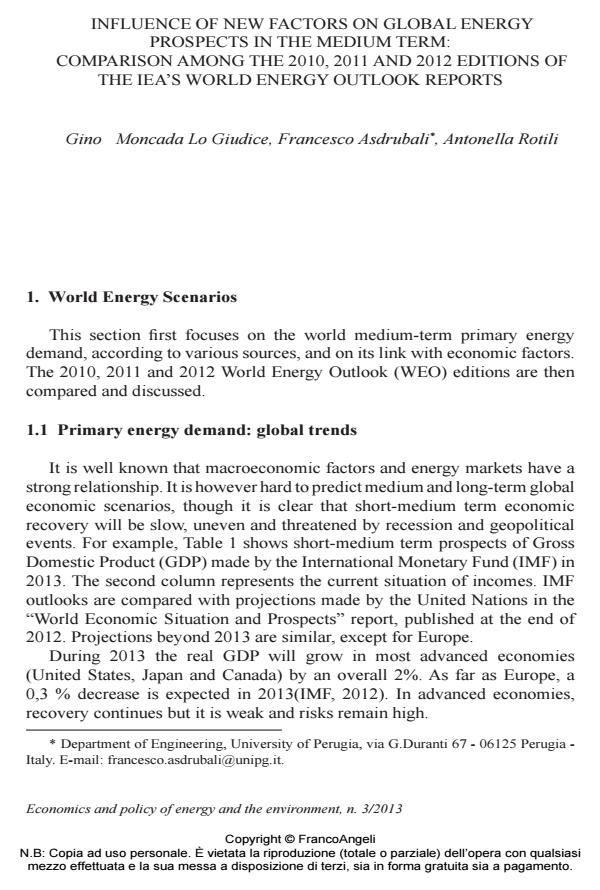Influence of new fac tors on global energy prospects in the medium term: compar ison among the 2010, 2011 and 2012 editions of the IEA’s World Energy Outlook reports
Journal title ECONOMICS AND POLICY OF ENERGY AND THE ENVIRONMENT
Author/s Lo Giudice Gino Moncada, Francesco Asdrubali, Antonella Rotili
Publishing Year 2014 Issue 2013/3
Language English Pages 23 P. 67-89 File size 2519 KB
DOI 10.3280/EFE2013-003003
DOI is like a bar code for intellectual property: to have more infomation
click here
Below, you can see the article first page
If you want to buy this article in PDF format, you can do it, following the instructions to buy download credits

FrancoAngeli is member of Publishers International Linking Association, Inc (PILA), a not-for-profit association which run the CrossRef service enabling links to and from online scholarly content.
Several economic, geopolitical, demographic and environmental factors drive world’s energy scenario; among them, the reduction of greenhouse gases emissions and the consequent development of renewable energy sources, the global financial crisis, the increase in global population and urbanization, the increase of fossil fuels prices have had a particularly strong impact in recent years. Furthermore, exceptional events, such as the accident at the Fukushima nuclear power plant in Japan, may occur to complicate World energy scenarios. The most recent reports on world energy markets, especially the WEO - World Energy Outlook, are characterized by the introduction of new prospects and scenarios, as a result of unpredictable events such as Fukushima accident or of emerging factors, such as the increasing share of unconventional resources in the future energy mix (shale gas and shale oil) and the importance of energy efficiency, proposing an "Efficient World Scenario". Disappointing signals about the development of renewables are also recorded. The paper focuses on the comparison among the major reports and statistical energy data, especially the 2010, 2011 and 2012 editions of the World Energy Outlook issued by IEA. Mid-term energy scenarios are presented and discussed, with particular emphasis on the increasing importance of energy efficiency, on the new prospects concerning nuclear power and on the role of unconventional fossil fuels.
Keywords: Energy scenarios, WEO, nuclear power, energy efficiency, nonconventional fossil fuels
Jel codes: Q4, Q41, Q47
- Potential of oil palm empty fruit bunch (OPEFB) and sugarcane bagasse fibers for thermal insulation application – A review Nor Azlina Ramlee, Jesuarockiam Naveen, Mohammad Jawaid, in Construction and Building Materials 121519/2021 pp.121519
DOI: 10.1016/j.conbuildmat.2020.121519 - Wave Energy Assessment along Sicilian Coastline, Based on DEIM Point Absorber Vincenzo Franzitta, Pietro Catrini, Domenico Curto, in Energies /2017 pp.376
DOI: 10.3390/en10030376 - Carbon Footprints Flavio Scrucca, Antonella Rotili, Andrea Presciutti, Francesco Fantozzi, Pietro Bartocci, Mauro Zampilli, pp.19 (ISBN:978-981-13-7911-6)
- Sugarcane - Its Products and Sustainability Rafael Alavéz-Ramírez, Fernando Chiñas-Castillo, Magdaleno Caballero-Caballero, Valentín Juventino Morales-Domínguez, Margarito Ortiz-Guzmán, Maria Eugenia Silva-Rivera, Roberto Candido Jimenez-Piñon, Angel Ramos-Alonso, (ISBN:978-1-80356-368-8)
- Adaptation to globalization in renewable energy sources: Environmental implications of financial development and human capital in China Muhammad Saeed Ashraf, Li Mingxing, Ma Zhiqiang, Rana Umair Ashraf, Muhammad Usman, Irfan Khan, in Frontiers in Environmental Science 1060559/2023
DOI: 10.3389/fenvs.2022.1060559 - Insulation materials for the building sector: A review and comparative analysis S. Schiavoni, F. D׳Alessandro, F. Bianchi, F. Asdrubali, in Renewable and Sustainable Energy Reviews /2016 pp.988
DOI: 10.1016/j.rser.2016.05.045 - Greening Our Cities: Sustainable Urbanism for a Greener Future Farres Yasser, Anton Ianakiev, Marisela Mendoza, Hynda Aoun Klalib, pp.295 (ISBN:978-3-031-49494-9)
Lo Giudice Gino Moncada, Francesco Asdrubali, Antonella Rotili, Influence of new fac tors on global energy prospects in the medium term: compar ison among the 2010, 2011 and 2012 editions of the IEA’s World Energy Outlook reports in "ECONOMICS AND POLICY OF ENERGY AND THE ENVIRONMENT" 3/2013, pp 67-89, DOI: 10.3280/EFE2013-003003